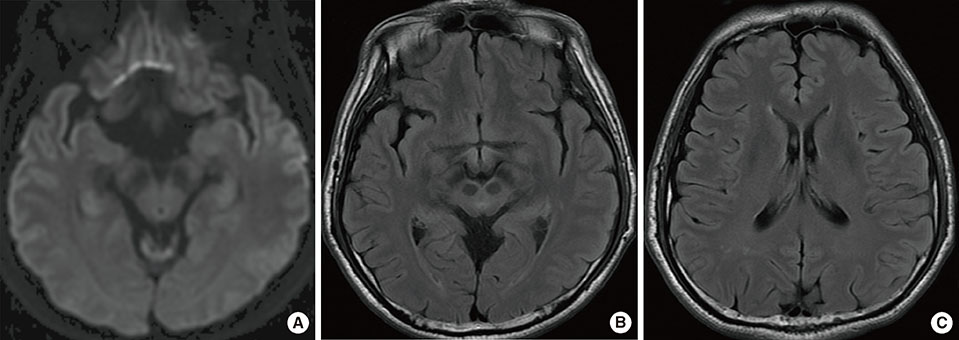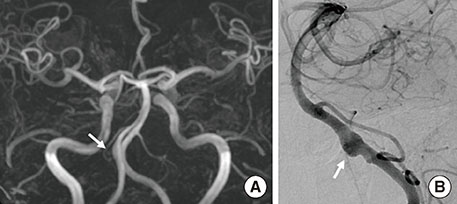Dement Neurocogn Disord.
2014 Jun;13(2):46-49. 10.12779/dnd.2014.13.2.46.
Vertebral Artery Dissection Presenting as Transient Global Amnesia: A Case Report and Review of Literature
- Affiliations
-
- 1Department of Neurology, Konkuk University Medical Center, Seoul, Korea. alzdoc@kuh.ac.kr
- 2Center for Geriatric Neuroscience Research, Institute of Biomedical Science, Konkuk University, Seoul, Korea.
- KMID: 1708695
- DOI: http://doi.org/10.12779/dnd.2014.13.2.46
Abstract
- Vertebral artery dissection is one of the most common causes of stroke in young adults. The course of the vertebral artery dissection is usually benign, and pure transient amnesia as an initial symptom has been rarely reported. We describe a patient with vertebral artery dissection who presented with acute transient amnesia, and review the medical literatures about the pathophysiological mechanism of transient global amenesia (TGA). This case could be a one of evidence which supports the cerebrovascular mechanism of TGA.
Figure
Reference
-
1. Lee VH, Brown RD Jr, Mandrekar JN, Mokri B. Incidence and outcome of cervical artery dissection: A population-based study. Neurology. 2006; 67:1809–1812.
Article2. Debette S, Leys D. Cervical-artery dissections: Predisposing factors, diagnosis, and outcome. Lancet Neurol. 2009; 8:668–678.
Article3. Sedlaczek O, Hirsch JG, Grips E, Peters CN, Gass A, Wohrle J, et al. Detection of delayed focal MR changes in the lateral hippocampus in transient global amnesia. Neurology. 2004; 62:2165–2170.
Article4. Lampl Y, Sadeh M, Lorberboym M. Transient global amnesia-not always a benign process. Acta Neurol Scand. 2004; 110:75–79.
Article5. Guillery-Girard B, Quinette P, Desgranges B, Piolino P, Viader F, de la Sayette V, et al. Long-term memory following transient global amnesia: An investigation of episodic and semantic memory. Acta Neurol Scand. 2006; 114:329–333.
Article6. Le Pira F, Giuffrida S, Maci T, Reggio E, Zappala G, Perciavalle V. Cognitive findings after transient global amnesia: Role of prefrontal cortex. Appl Neuropsychol. 2005; 12:212–217.
Article7. Jager T, Bazner H, Kliegel M, Szabo K, Hennerici MG. The transience and nature of cognitive impairments in transient global amnesia: A meta-analysis. J Clin Exp Neuropsychol. 2009; 31:8–19.
Article8. Bartsch T, Deuschl G. Transient global amnesia: Functional anatomy and clinical implications. Lancet Neurol. 2010; 9:205–214.
Article9. Kim J, Kwon Y, Yang Y, Jang IM, Chang Y, Park YH, et al. Clinical experience of modified diffusion-weighted imaging protocol for lesion detection in transient global amnesia: An 8-year large-scale clinical study. J Neuroimaging. 2013.
Article10. Bartsch T, Alfke K, Stingele R, Rohr A, Freitag-Wolf S, Jansen O, et al. Selective affection of hippocampal CA-1 neurons in patients with transient global amnesia without long-term sequelae. Brain. 2006; 129:2874–2884.
Article11. Pearce JM, Bogousslavsky J. 'Les ictus amnesiques' and transient global amnesia. Eur Neurol. 2009; 62:188–192.12. Bartsch T, Alfke K, Deuschl G, Jansen O. Evolution of hippocampal CA-1 diffusion lesions in transient global amnesia. Ann Neurol. 2007; 62:475–480.
Article13. Milusheva EA, Baranyi M. Implication of ionotropic glutamate receptors in the release of noradrenaline in hippocampal CA1 and CA3 subregions under oxygen and glucose deprivation. Neurochem Int. 2003; 43:543–550.
Article14. Jang JW, Park SY, Hong JH, Park YH, Kim JE, Kim S. Different risk factor profiles between transient global amnesia and transient ischemic attack: A large case-control study. Eur Neurol. 2014; 71:19–24.
Article15. Hodges JR, Warlow CP. Syndromes of transient amnesia: Towards a classification. A study of 153 cases. J Neurol Neurosurg Psychiatry. 1990; 53:834–843.
Article16. Pantoni L, Bertini E, Lamassa M, Pracucci G, Inzitari D. Clinical features, risk factors, and prognosis in transient global amnesia: A follow-up study. Eur J Neurol. 2005; 12:350–356.
Article17. Chung CP, Hsu HY, Chao AC, Chang FC, Sheng WY, Hu HH. Detection of intracranial venous reflux in patients of transient global amnesia. Neurology. 2006; 66:1873–1877.
Article18. Akkawi NM, Agosti C, Borroni B, Padovani A. Detection of intracranial venous reflux in patients of transient global amnesia. Neurology. 2007; 68:163. author reply 163.
Article19. Schreiber SJ, Doepp F, Klingebiel R, Valdueza JM. Internal jugular vein valve incompetence and intracranial venous anatomy in transient global amnesia. J Neurol Neurosurg Psychiatry. 2005; 76:509–513.
Article20. Georgiadis D, Lanczik O, Schwab S, Engelter S, Sztajzel R, Arnold M, et al. IV thrombolysis in patients with acute stroke due to spontaneous carotid dissection. Neurology. 2005; 64:1612–1614.
Article
- Full Text Links
- Actions
-
Cited
- CITED
-
- Close
- Share
- Similar articles
-
- A Case of Vertebrobasilar Insufficiency Due to Cervical Spondylosis who Showed Transient Global Amnesia after Vertebral Angiographyl
- Transient Global Amnesia Associated With Coil Embolization of Cerebral Aneurysm
- Retrograde Amnesia as a Predominant Symptom of Transient Global Amnesia
- Recurrent transient amnesia: a case of transient epileptic amnesia misdiag-nosed as transient global amnesia
- Insular Infarction Presenting With Transient Global Amnesia



